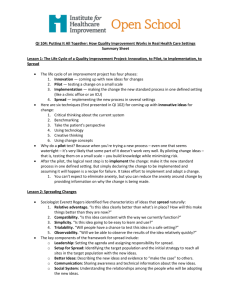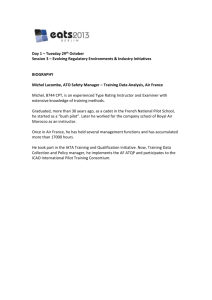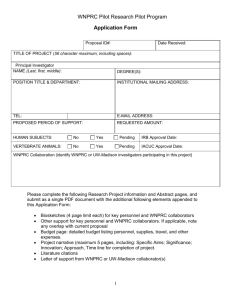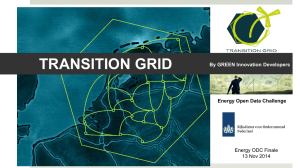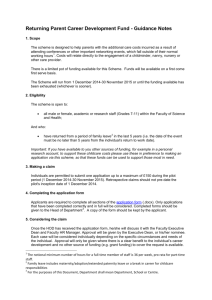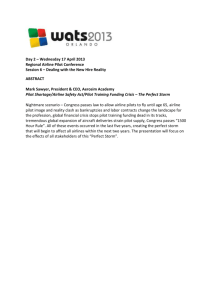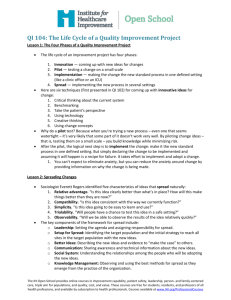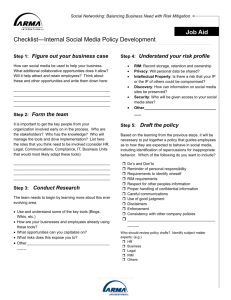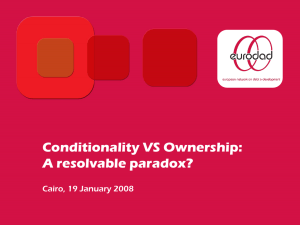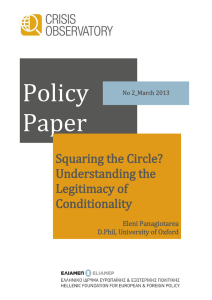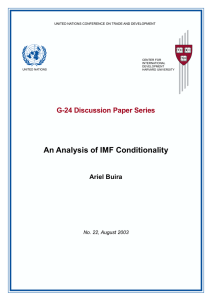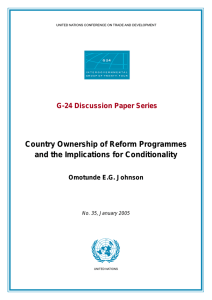BIG Pilot Project: Lessons for Namibia and southern Africa
advertisement
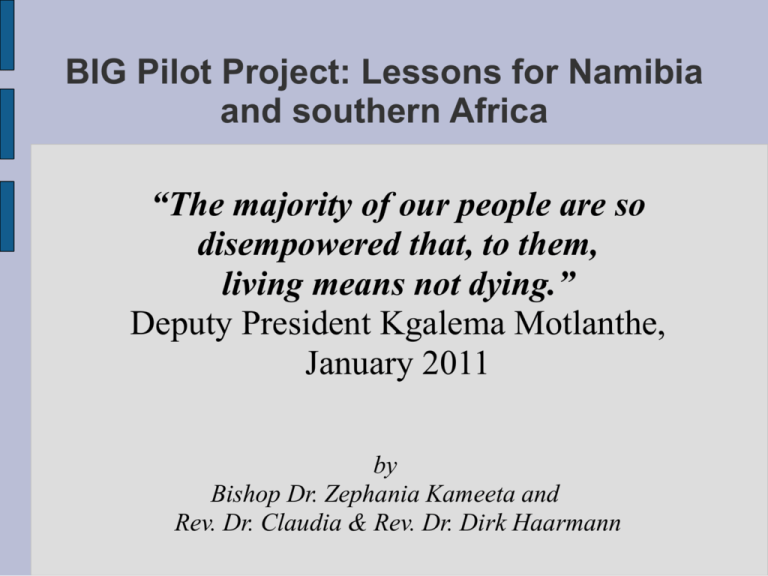
BIG Pilot Project: Lessons for Namibia and southern Africa “The majority of our people are so disempowered that, to them, living means not dying.” Deputy President Kgalema Motlanthe, January 2011 by Bishop Dr. Zephania Kameeta and Rev. Dr. Claudia & Rev. Dr. Dirk Haarmann Structure of the Presentation I. II. III. IV. The BIG Policy Proposal and the Pilot Social and historical context BIG - food security and health BIG a prerequisite for education and employment creation V. Affordability VI. Universality VII. Conditionality VIII.Politics and the reality of the Pilot I. The BIG policy proposal Monthly cash grant (e.g. N$100) paid to every Namibian citizen (as a right) The money of people not in need or in poverty is recuperated through the tax system The BIG is redistributive, the rich will pay more to finance those in need I. The Pilot Project January 2008 to December 2009 in OtjiveroOmitara Everybody in the village below 60 years (930 recipients) received N$ 100 (US$ 13) every month Comprehensive Research: Baseline Study in November 2007 Impact studies in June and November 2008 II. Social and Historical context: Life before BIG This is the way we suffered and lived, us from Otjivero/Omitara. We begged everyday for food because we didn’t have anything at home and during the evening we got in pieces of a blanket. Even the shack we were staying in was not rainproof because when it rained the water just went through. We had to hide in the corners to avoid getting wet. We slept on the ground because there was no bed or a mattress. We did not even have proper plates. We made fire and put pots beside it. Only salt and pots can be seen besides the fire. Whenever the wind blew, the few corrugated zinc sheets on the shack were blown away. We just idled around because of hunger, and as the result we were forced to eat old and rotten corns of maize. We were literally begging for food. I prayed under the tree so that something will happen one day and I will become a human again. Our stomachs were empty, no clothes to put on, no shoes, and no land to live on. In the II. Social and Historical context: Life before BIG There is a problem of unemployment and we don’t have money to travel to Gobabis and Windhoek to look for work. I and my three children depend on my unemployed parents for food and accommodation. Sometimes I wish I was dead because I cannot stand this type of life anymore. I am supposed to provide and protect my children and parents but I am failing to do that. II. Social and Historical context: ”The majority of our people are so disempowered that, to them, living means not dying.” The main question for our people is: Is there life before death? BIG is a question of being human, lifting people up from the dust and to give them back their dignity II. Social and Historical context: ”The majority of our people are so disempowered that, to them, living means not dying.” Disempowerment, so what do you do? The question is first disempowered by whom? In Southern Africa that still means by colonialism, apartheid – an unjust state A democratic state then needs to cancel that injustice – that is the role of the state to rectify structural injustice and replace them with social justice III. BIG – Food Security and Health 0 .1 .2 .3 .4 .5 -4 -2 0 x Nov 2007 Nov 2008 2 Jun 2008 WHO normal 4 Malnutrition of children was reduced from 42% to 10% in one year Health IV. BIG a prerequisite for Education and Employment To offset cash to people against education and employment is like asking a destitute person, to choose between water and food! The BIG is not an alternative to education and employment but a prerequisite! Education Small business development After the introduction of the BIG I started my business. I bake traditional bread every day. I bake 100 rolls per day and sell each for N$1 (one dollar). I sell all the rolls in a day and a profit of about N$400 (four hundred dollars) per month. My business is good and I believe that it will grow. (...). I run it with the help of my children. Because of my thankfulness and good experience with the BIG I expressed my thank you in those big letters as you can see on my house. (Frieda Nembwaya) Local economic growth Average monthly per capita income in N$ - excluding BIG Income from: self-employment increased by 300% N$ 160 N$ 150 Income (wage, selfemployment, farming) N$ 140 N$ 130 N$ 152 N$ 120 N$ 134 N$ 110 N$ 118 N$ 100 Nov 07 Jul 08 Nov 08 V. Affordability The cost of a BIG for all are 5.7% of the national budget VI. Universality Low administrative costs No corruption Targeting through taxation, without poverty trap Strengthening social cohesion VII. Conditionality Conditionality is patronizing Empower people to live responsibly Trust people, the poor should not be viewed with more suspicion then the rich VIII. Politics and the Reality of the Pilot BIG is not a foreign concept, but stems from a Namibian Cabinet Commission BIG is a Namibian reality not an abstract concept The Ministries are supporting Otjivero and engage constructively, yet, some in Government act as if Otjivero does not exisit Way forward BIG Pilot Project has proven the effectiveness of a universal basic income to promote social development (eradicate hunger and destitution) and to foster local economic development Political struggle and mass campaign
